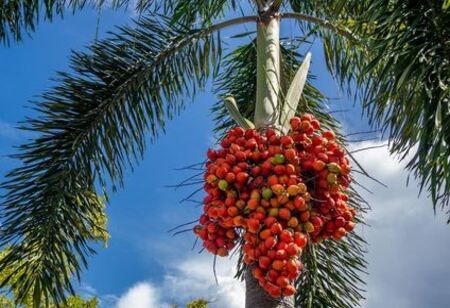
India Becomes Malaysia's Top Oil Palm Seed Buyer


India is now Malaysia's biggest importer of oil palm seeds that have germinated, and demand is rising as the nation pushes to increase its own palm oil production and lessen its reliance on imports.
As the largest market for Malaysian palm oil, India imported 3.03 million tonnes of the oil from Malaysia in 2024, accounting for 17.9 percent of Malaysia's total palm oil exports.
Under the National Mission on Edible Oils-Oil Palm initiative, India hopes to produce roughly 2.8 million tons of crude palm oil by 2029–2030 and quickly increase palm oil cultivation to 1 million hectares by 2025–2026.
"There has been a noticeable increase in demand for Malaysian oil palm seeds, particularly from India," Malaysian Palm Oil Board Director General Ahmad Parveez Ghulam Kadir says.
As of mid-2025, the nation's palm oil production has expanded to over 370,000 hectares, with a special emphasis on the northeastern states and island regions.
Also Read: Marketing Lessons from India's Favorite Chocolate Laddoo
However, Kadir pointed out that the majority of the seed trade is still done informally, with supplies being delivered on a one-time basis through consignments without official contracts or long-term agreements.
The majority of transactions take place through business-to-business agreements, with Malaysian exporters offering technical know-how and high-quality planting materials.
The move coincides with a slowdown in Malaysia's palm oil exports to India after New Delhi recently lowered crude palm oil rates.
India's pricing changes, according to Kadir, are a part of larger policy initiatives to control local supply and maintain consumer affordability in cooking oil prices.
"While Malaysia has seen some moderation in export volumes to India, we remain a key and reliable supplier, and the Indian market continues to be a priority," he said.
As it promotes sustainable palm oil certified under the Malaysian Sustainable Palm Oil standard, Malaysia is enlisting stakeholders to bolster its position in the food industry and hospitality sectors, where demand is still high.
Through breeding initiatives, the Malaysian Palm Oil Board has created new high-yield cultivars that have the potential to yield over 30 tons of fresh fruit bunches per hectare per year, which is almost twice Malaysia's national average of 15.47–16.73 tonnes reported between 2020 and 2023.
In addition to having slower height growth, the enhanced types make harvesting easier and increase their economic longevity from 25 to over 30 years.
Also Read: 5 Women Chief Product Officers Driving Innovation to the Future
With appropriate agricultural methods and sufficient irrigation, current Malaysian commercial seeds can be grown in India, according to Kadir, who also noted that the materials have fared well in tropical climates that are comparable to many Indian locations with enough rainfall.
Although none have been commercially marketed yet, research is being done to create climate-resilient cultivars with enhanced drought tolerance, he added.